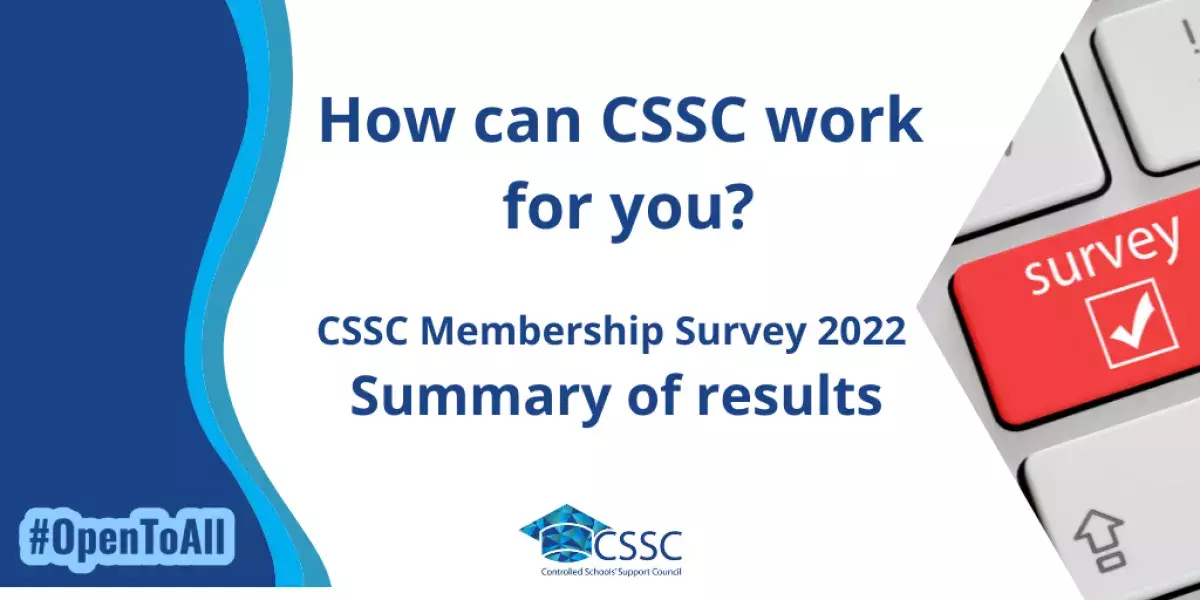- About us
- Schools
- Area planning
- Find your Schools’ Support Officer
- Best practice case studies
- Funding opportunities
- School vacancies
- Shared education
- #OpenToAll
- CSSC Award in Excellence in Educational Research
- Erasmus+
- CSSC Membership Survey 2022 – Results
- CSSC Sign Language programme - engaging with sign, a language for you and me
- Governors
- News
- Events
- Publications
- Ethos
- #OpenToAll
- Contact
- Search
CSSC Membership Survey 2022 – Results

Thank you to all controlled school leaders who took the time to complete CSSC's membership survey 2022.
The survey has now been analysed and the summary set out below.
Communication
The majority of respondents agreed that CSSC effectively communicates with the sector, in addition respondents confirmed that they access all forms of CSSC communication – with a preference for email and social media.
While it is clear that the information CSSC provides to schools is considered to be informative, useful and relevant, it is noticeable that due to time pressures Principals can only dedicate minimal time to browsing each form of communication. It is therefore important that the information CSSC provides is relevant, succinct and concise, so that it can be quickly read and understood.
It is clear that school leaders value CSSC initiating contact, particularly in the form of face to face visits.
Events
CSSC events are well received and the majority of respondents agreed that they are beneficial and aligned with the needs of controlled schools. Indeed 45% said that the information and knowledge gained from CSSC events had impacted on their working practices. It is important to take into consideration the timings of CSSC events, with Thursday afternoons being most preferable, and plenty of notice given ahead of events for planning.
School representation
It is positive that 84% of respondents know who their Schools’ Support Officer is, a similar proportion to the 2019 survey. However only 59% knew that each school phase has a representative on the board of directors. This needs more promotion, particularly considering that the Council was recently reconstituted.
Key functions
It is clear that school leaders welcome and appreciate CSSC’s advocacy work on behalf of controlled schools. Many schools praised the work in estate planning in particular. The capacity of CSSC in advocating for controlled schools in relation to broader educational issues, especially the Integrated Education Bill was one of much contention in the survey responses. While a number of school leaders commended CSSC’s work regarding the Integrated Education Bill a number thought that CSSC did not go far enough in its response.
Similar trends are noticeable throughout the survey responses in relation to CSSC’s relationship with EA, there is clarification needed on the role CSSC plays.
The CSSC Self-Evaluation Ethos Toolkit was well received by school leaders, with many commenting on the useful guidance and support provided.
Cross Organisational Link Officer role
The role of CSSC Cross Organisational Link Officers (COLO) in response to the Covid-19 pandemic was valued by school leaders, the responses showed that leaders valued the support of their CSSC COLO, particularly in providing guidance, support and a point of contact and reassurance in a challenging time. The Schools’ Support Officer role also gives member schools a dedicated officer to contact when issues arise and 68% of respondents stated that they are satisfied with the support provided by their Schools’ Support Officer.
Overall
The membership survey responses have shown that on the whole school leaders are aware of CSSC’s work and value its advocacy role on behalf of the sector. The survey has also highlighted the need for some clarification and better promotion of certain areas of work. For example in relation to Governors and the respective roles and responsibilities of CSSC and EA and the nature of their relationship.
The survey has shown some areas which need to be considered at a strategic level, particularly regarding the changes in the educational landscape associated with the Integrated Education Bill and its implications for area planning.
It must be noted that this survey took place in a very different educational context compared to the previous survey – in particular, CSSC quickly responded to the Covid-19 pandemic and adapted its work programme to prioritise support for schools through the COLO role. While some areas of work were postponed, the COLO role became a main focus of the education support team, and all CSSC communications had to compete with a multitude of other communications to schools, including guidance and daily surveys. In addition, the ripple effect of the Integrated Education Bill on communications and advocacy work puts CSSC in a difficult position as the support body for controlled schools which are characteristically open and inclusive, including a number of controlled integrated schools.
While many of the survey responses compliment and support the work of CSSC on behalf of the controlled sector, the survey also indicates there are a number of areas in which schools require more from CSSC in terms of support and advocacy. CSSC has always prioritised listening to member schools and welcomes dialogue and feedback to assist in enhancing and improving support to best align our programme of work with the needs of the controlled sector.




